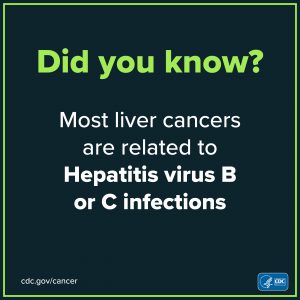Liver Cancer Is Preventable: Find Out How During October’s Liver Cancer Awareness Month
Posted on byDemetrius M. Parker
The percentage of Americans who get liver cancer has been rising for several decades. We know this, thanks to CDC’s United States Cancer Statistics database (USCS) administered by CDC’s Division of Cancer Prevention and Control. USCS data allow us to follow liver cancer trends. Using the CDC data we are able to understand and design responses to help prevent and control liver cancer problems. Most importantly, we are able to monitor our success.
Liver Cancer May be Undetectable Until Late Stage Symptoms Occur
The data reveal that each year in the United States, about 34,000 people get liver cancer, and about 27,000 people die from the disease. Liver cancer in its early stages may not have noticeable symptoms. Also, when symptoms do occur, they could be related to other health conditions.
Late Symptoms of Liver Cancer
- Discomfort in the upper abdomen on the right side.
- A swollen abdomen.
- A hard lump on the right side just below the rib cage.
- Pain near the right shoulder blade or in the back.
- Jaundice (yellowing of the skin and whites of the eyes).
What Causes Liver Cancer?

Along with several other behaviors and conditions that increase the risk of getting liver cancer, many liver cancer cases are related to hepatitis B virus or hepatitis C virus infections. Most people don’t know they have a hepatitis virus, making liver cancer more challenging to diagnose.
“An emerging cause of liver cancer is an increase in the occurrence of nonalcoholic fatty liver disease and nonalcoholic steatohepatitis,” explains Behnoosh Momin, DrPH, MS, MPH. Momin is a health scientist with CDC’s Division of Cancer Prevention and Control (DCPC). She leads the division’s liver cancer prevention research that finds beneficial ways to use the science to help deal with world health challenges.
Fortunately, the increase in liver cancer cases can be reversed. Liver cancer is preventable when people follow these three important steps.
How to Reduce Your Risk for Liver Cancer
You can lower your risk of getting liver cancer in the following ways:
- Get vaccinated against hepatitis B. The hepatitis B vaccine is recommended for all infants at birth and for adults who may be at increased risk.
- Get tested for hepatitis C, and get medical care, if needed.
- Drink less alcohol.
How to Overcome Barriers to Care and Prevent Liver Cancer
Momin directs CDC’s action plans to develop and apply tested research for liver cancer and its risk factors. She serves as co-lead for the Vaccine Preventable Workgroup under the National Comprehensive Cancer Control Partnership.
She outlines five actions that the NCCCP collaboration is taking to prevent and control liver cancer. They include:
- Focusing on awareness and knowledge of the risks.
- Understanding which interventions are most effective to reverse trends.
- Improving surveillance by following liver cancer cases over time.
- Improving delivery of viral hepatitis services throughout a patient’s health journey.
- Promoting hepatitis B vaccination to prevent infection and screen for hepatitis B and C virus infections.
Momin explains: “Working together with partners at the national and local levels is key to prevent liver cancer. CDC is one of 19 partners under the partnership. This is essential and effective in preventing liver cancer. It is the major focus of my work.”
Remember, liver cancer is preventable. Talk with your doctor about reducing your risks.
Resources
Get the Statistics You Need via CDC’s Cancer Data Visualization Tool
Leading Cancer Cases and Deaths, All Races/Ethnicities, Male and Female, 2017
Publications
Posted on by

